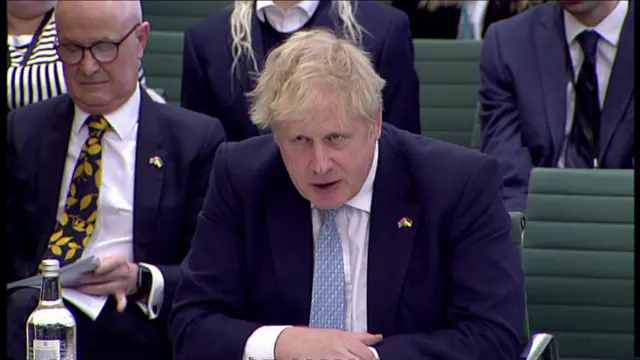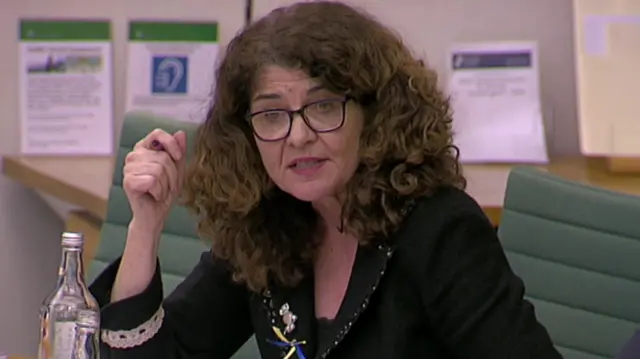Thanks for joining uspublished at 17:09 BST 30 March 2022
That concludes our coverage of today's events in Parliament - from PMQs to the Liaison Committee, the PM has faced questions on Ukraine, the cost of living and partygate.
Join us again soon.
Boris Johnson has faced questions from senior MPs at the Liaison Committee
The PM condemned President Putin's ruthlessness and said he wanted to increase assistance to Ukraine
Questioned about the cost of living, he said the route out of poverty was through work and promised to look at benefit payments
Initial questions honed in on partygate, after the Met revealed it had issued 20 fixed penalty notices so far for lockdown-breaking parties in and around Downing Street
Police will not reveal the names of those fined, but No 10 has promised to confirm if the PM receives one
At last week's Spring Statement, Rishi Sunak announced a rise in the wage threshold where people start paying National Insurance, a 5p cut to fuel duty and promised future tax cuts
Critics say the economic plan did not do enough to help those hardest hit by rising prices, especially energy and food
Edited by Georgina Pattinson, Jennifer Scott and Justin Parkinson
That concludes our coverage of today's events in Parliament - from PMQs to the Liaison Committee, the PM has faced questions on Ukraine, the cost of living and partygate.
Join us again soon.
The PM was questioned at length about the Ukraine crisis. His main points were:
Johnson backs more UK nuclear and offshore power supplies
Labour's Clive Betts finishes up the session by thanking the prime minister.
And it is all over!
We will bring you more analysis and reaction from the committee here, so don't go anywhere...
Tory MP Mel Stride asks if the government has started looking at cutting expenditure, as a result of inflation and the reduction in the rate of income tax, due to come in in 2024.
The PM says there's been "massive pressure" on public finances since Covid hit, but ministers took a decision not to return to austerity.
The cost of interest on the government's debt is £83bn a year and could go up, so it has to be "very, very careful" in deciding how much to spend, he adds.
Stride says exports and imports have stayed "very low" following the pandemic and asks whether the UK is becoming more of a "closed economy" because of Brexit.
The PM says he doesn't want this to happen and he wants "much more of an export drive" and it is a matter of "will and energy and ambition".
Tory MP Mel Stride, who chairs the Commons Treasury Committee, says rapidly increasing inflation is higher than the rate of benefit rises, which was decided last year.
He asks whether payments could be revisited in a couple of months.
Otherwise some people will see 10% reduction in net income, Stride tells the PM.
Boris Johnson promises to look into his colleague's suggestion, saying the "aftershocks" of the rises in energy prices - which are driving much of the increase in inflation - are difficult to deal with.
Many of the government's policies are designed "to tide people over through a tough time", he adds.
 Image source, UK Parliament
Image source, UK ParliamentContinuing on the cost of living theme, Catherine McKinnell is back and questioning the figures the PM is using.
She says 75% of children living in poverty across the UK are living in working households, and the government's measurement of absolute child poverty is not accurate.
The Labour MP points to one of the government's central policies and asks: "Do you believe it is possible to level up the country without reducing the number of children living in poverty?"
"No," says the PM.
Despite disputing her figures, he accepts "there is an issue we have got to fix", adding: "I am not going to pretend it is easy, but we are going to go at it as hard as we can."
So, how many times is child poverty mentioned in the levelling up white paper published by the government?
McKinnell reveals it is none.
Johnson replies it is an accident "because the whole objective of levelling up is to make sure kids growing up everywhere have opportunity."
Asked about last week's Spring Statement, the PM says the government is prioritising helping people back into work.
But Labour's Stephen Timms says more needs to be done to boost Universal Credit to help those who can't work for health reasons.
Boris Johnson responds by saying there is direct support for those facing "particular hardships" because of rising inflation, and the "fundamental route out of poverty" is getting people into jobs.
Labour's Stephen Timms queries the PM's previous statement that there are now more people in work than before the pandemic, asking if he accepts a correction made last month by the head of the UK Statistics Authority, Sir David Norgrove.
Boris Johnson accepts that it was "payroll employment" he was talking about, and that the number has now risen by 600,000, which "is not half bad".
Timms asks if that number is more than offset by the fall in the number of self-employed people.
The PM replies that unemployment had been predicted to hit 12% and this has not happened, adding that the government wants to help more people back into work.

 Ione Wells
Ione Wells
Westminster Correspondent, BBC News
The government's energy strategy - which was expected this week - has been delayed again.
There have been reports that tensions over nuclear power have been one factor behind the delay - with reports the Treasury have been reluctant to commit outright to some of the huge costs of nuclear power given some of the targets the strategy is likely to set will fall outside the current Spending Review period.
The prime minister has previously said, for example, that he wants 25% of UK power sourced from nuclear by 2050.
There have also been tensions in cabinet over wind energy.
Some ministers want to loosen planning laws in England to enable more onshore wind farms, but others oppose this.
There is, however, pretty widespread support for more offshore wind turbines.
When asked about the energy strategy, the prime minister seemed to drop some pretty strong hints about where his preferences lie.
He said "offshore wind - I stress offshore wind - has massive potential" and added "so does nuclear".
His message to cabinet colleagues here seems pretty clear, though No10 have also stressed in recent weeks that they want to keep all options on the table to help the UK become more energy independent and move towards net zero and away from Russian oil and gas.
Tory Philip Dunne takes up the questioning on the cost of living, focusing on energy prices.
He says since we began to emerge from the pandemic, households have faced an "astonishing increase " to their bills, exacerbated by Ukraine.
But, he asks, will the much talked about - and much delayed - government energy security strategy address that?
The PM says the government "have to provide as much short term relief as you can within fiscal constraints", pointing to the likes of the council tax rebate on its way, but also the need to look at North Sea oil and gas.
"But we have got to recognise in the UK that we have failed for a generation to put in enough long term supply," he adds, calling it a "colossal mistake".
As well as renewables - and the PM stresses offshore wind specifically, rather than onshore - he wants to focus on nuclear, saying: "This is the country that split the atom... why aren't we doing it?"
Johnson adds: "I am not going to pretend we are going to get nuclear reactors on stream in next couple of years, but in the medium and long term, we have got to be looking at big ticket nuclear solutions."

 Ione Wells
Ione Wells
Westminster Correspondent, BBC News
As the conversation shifts from Ukraine onto the cost of living - one area that bridges the two is the soaring costs facing farmers right now.
Fertiliser and fuel costs for farmers have risen drastically due to rising gas prices.
It's something the industry has warned could lead to shortages, cuts in food production, and a knock-on impact on the cost of food.
The Tory MP Neil Parish urged the prime minister to do more to help farmers with fertiliser costs - including reopening a second fertiliser plant in the north of England.
The prime minister was loathe to make a solid commitment to doing so without more information to hand - saying he can't just "wave a massive wand" but said he would "jolly well find out what I can do".
Johnson and Wishart on police investigating lockdown parties
Questions move on to the rising cost of living. Tory MP Neil Parish says the UK must produce more of its own food to protect consumers from global price increases.
Farmers want to do it, he adds, asking what the government can do to help.
The PM says he shares Parish's ambition and that investment in agriculture is rising. But young people need to be encouraged into the sector, he argues, adding that his own grandfather was a farmer, albeit "very unsuccessfully".
Every UK embassy around the world is getting a food and drink export expert, Boris Johnson says.
 Ione Wells
Ione Wells
Westminster Correspondent, BBC News
While parties have come together in Parliament in recent weeks to express solidarity with Ukraine - the government's refugee scheme has generally attracted the most scrutiny, from Tory and opposition MPs alike.
The prime minister faced further questions on why applications for Ukrainian visas have reached 28,300, but only 2,700 have been granted. He also was asked about safeguarding concerns around Ukrainians being put up in people's homes in the UK.
The Tory MP Sir Bill Wiggin also pushed him on "why can't we get right people through our immigration system instead of the wrong ones."
This is a reference to a criticism that many Tory MPs - including some ministers privately - have levelled at the government around their handling of small boat migrant crossings.
The prime minister insisted that officials were processing about 1,000 visas a day for Ukrainians and that it was "right to have checks both ways" for Ukrainians coming to the UK - as well as UK families offering to host them.
Chair Clive Betts refers back to promises made by the government on the two schemes - families bringing relatives over, and the Homes for Ukraine scheme.
He says one committee was told local councils would receive £10,500 per refugee, no matter which scheme they come through, to provide services for them.
But another select committee was told the funding was only available for people coming via Homes for Ukraine.
Which is it?
Johnson says it is right that councils will only get funding for refugees offered rooms by strangers, not those reuniting with families.
He said they would still be able to access benefits, the NHS and education, which is "a considerable package of support".
But Betts says councils will be left with lots more people to provide services to "with not one penny of extra help".
The PM says most Ukrainians want to remain in the region they are from and would like to return home when the conflict ends.
Officials dealing with refugees have to balance some difficult objectives, he adds, as "gangsters" are attempting to traffic the vulnerable and some people are "not who they say they are".
Conservative MP Sir Bill Wiggin asks why the UK immigration system can't get "the right people through, rather than the wrong ones".
Johnson says the system is being kept under constant review and that the government is trying to get more visa applications processed.
He adds that he wants to see "more wonderful Ukrainians coming" to the UK.
The Labour MP then raises Homes for Ukraine - where British citizens offer a home to Ukrainian refugees.
She says only one in 100 offers has resulted in a visa being issued.
But how many of those have actually arrived in the UK?
The PM still doesn't have a number.
Dame Diana Johnson tells the story of a heavily pregnant woman who has been matched with a home in the UK, but has been told she has to give birth to her child in temporary accommodation in Poland to get the child a birth certificate, before flying here.
"Is that how scheme should be operating?" she asks.
"I can't see any reason why she couldn't come here and have the baby here," says the PM.
 Image source, uk Parliament
Image source, uk ParliamentNext up is the issue of visas, and Dame Diana Johnson leads the questioning.
She asks whether the PM considered going for an emergency humanitarian visa for those fleeing war, rather than the schemes the Home Office has put in place.
The PM says "of course I thought about having a system when we opened the doors" - but he is interrupted by the Labour MP, who says an emergency visa would still allow checks when people arrived.
Johnson says he wanted "a light tough system" but one that would also allow the UK to do checks for security.
He says have been 25,000 visas approved so far - "not a bad number" - and 1,000 visas were being processed a day.
"The number will mount quickly," he adds.
You can read more about the visa issue here